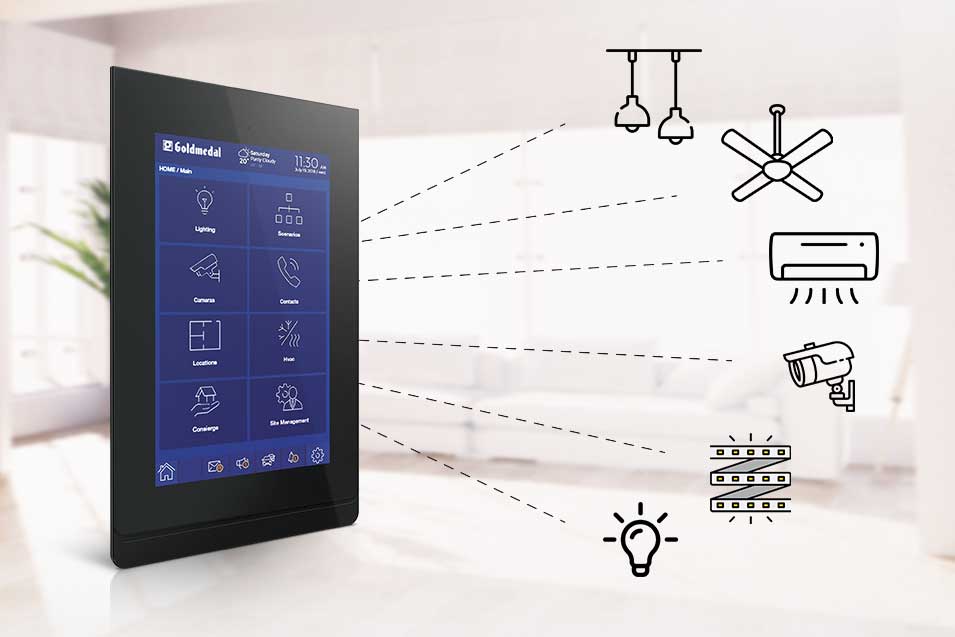
Advantages of Smart-Home Automation
Introduction
In the digital age, the concept of a smart home is no longer a futuristic vision—it’s a present-day reality. Smart-home automation has revolutionized the way we interact with our living spaces, making homes more comfortable, secure, and energy-efficient. It’s about harnessing technology to complement and enhance our daily lives. From the moment we wake up to the sounds of a pre-set playlist, to the moment we drift off to sleep in a climate-controlled environment, smart-home technology is there to add convenience, safety, and efficiency. Let’s dive into the myriad advantages of this technological marvel.
- Simplicity and Convenience: The cornerstone of smart-home automation is convenience. With a few taps on a smartphone or voice commands, homeowners can control various aspects of their home. Imagine adjusting the thermostat, turning off lights, or checking security cameras from anywhere in the world. Gone are the days of worrying if you left the oven on or the garage door open—now, a quick look at your phone can put your mind at ease.
- Energy Efficiency and Cost Savings: Smart homes are not just about comfort; they are also about being eco-friendly. Smart thermostats learn your schedule and preferences, adjusting the temperature to optimize energy use. Smart lights can dim or turn off when not needed, and energy monitors provide real-time feedback on electricity consumption, helping to cut down on waste and reduce bills.
- Enhanced Security: Smart-home automation elevates security to new heights. With smart locks, you can grant or deny access to your home remotely. Surveillance cameras can be monitored from your smartphone, and smart alarms can notify you immediately of any unusual activity. These features provide peace of mind, whether you’re in bed or across the globe.
- Accessibility for Everyone: Accessibility is another significant benefit of smart-home automation. Elderly individuals or those with disabilities can control their environment with voice commands or simplified interfaces, granting them greater independence and quality of life.
- Health and Well-being: Smart homes can also contribute to your health and well-being. Air quality monitors can alert you to increased levels of carbon monoxide or other harmful gases. Smart water purifiers ensure you have access to clean drinking water, and connected health devices can monitor vital signs and remind you to take your medication on time.
- Home Maintenance: Maintenance becomes less of a hassle with smart-home technology. Leak detectors can alert you to water issues before they become disasters, and smart appliances can notify you when they need servicing or when supplies are low.
- Entertainment: Home entertainment has transformed with smart-home automation. With multi-room audio systems, streaming services, and smart TVs, you can enjoy your favourite music, shows, or movies in any room of the house, all synchronized and controlled with ease.
Conclusion
The advantages of smart-home automation are vast and impactful, extending beyond mere convenience to offer significant improvements in security, energy efficiency, and quality of life. As this technology becomes more accessible and user-friendly, it’s not hard to imagine a future where smart homes are the standard, providing us with a living space that’s not only responsive to our needs but anticipatory of them. The smart home is not just a collection of gadgets; it’s a holistic living experience that adapts to and enriches our lives in ways we are just beginning to explore. With every innovation, our homes become more aligned with our needs, creating spaces that are not only more intelligent but more human. The era of smart-home automation has arrived, and it’s here to make our lives simpler, safer, and more enjoyable.
Frequently Asked Questions (FAQs) :
Q1. How does Smart-Home Automation contribute to energy efficiency?
Smart-home automation significantly enhances energy efficiency by allowing precise control over heating, lighting, and appliances. Automated systems can adjust settings based on occupancy or time of day, reducing power consumption. For example, lights can turn off automatically in unoccupied rooms, and thermostats can adjust to energy-saving temperatures when no one is home.
Q2. Can Smart-Home Automation enhance the security of my property?
Yes, smart-home automation can boost property security. Systems can include automated locks, surveillance cameras, and alarm systems that are controllable remotely. Homeowners receive alerts for unusual activities, and cameras can be checked from smartphones. Automated lighting can also deter burglars by simulating occupancy.
Q3. How does automation save time in daily chores?
Automation saves time by handling routine tasks automatically. For instance, smart vacuums can clean floors without manual intervention, and smart appliances can be programmed to start at convenient times. This reduces the time spent on household chores, allowing more time for other activities.
Q4. Is Smart-Home Automation accessible for individuals with disabilities?
Smart-home automation is particularly beneficial for individuals with disabilities, offering enhanced accessibility and independence. Voice-activated controls, remote access apps, and automated systems make it easier to manage lighting, temperature, and appliances, reducing the need for physical interaction.
Q5.What role does Smart-Home Automation play in health care?
In health care, smart-home automation plays a vital role by monitoring health-related metrics and enhancing patient comfort. Automated systems can remind patients to take medication, track vital signs, and adjust environmental settings for optimal health. They also allow remote monitoring by health professionals.
Q6. Can Smart-Home Automation be integrated into existing homes?
Yes, smart-home automation can be integrated into existing homes. Many systems are designed to be retrofit and do not require extensive modifications. Devices like smart plugs, wireless sensors, and Wi-Fi-connected appliances can easily be added to enhance a home’s automation capabilities.

